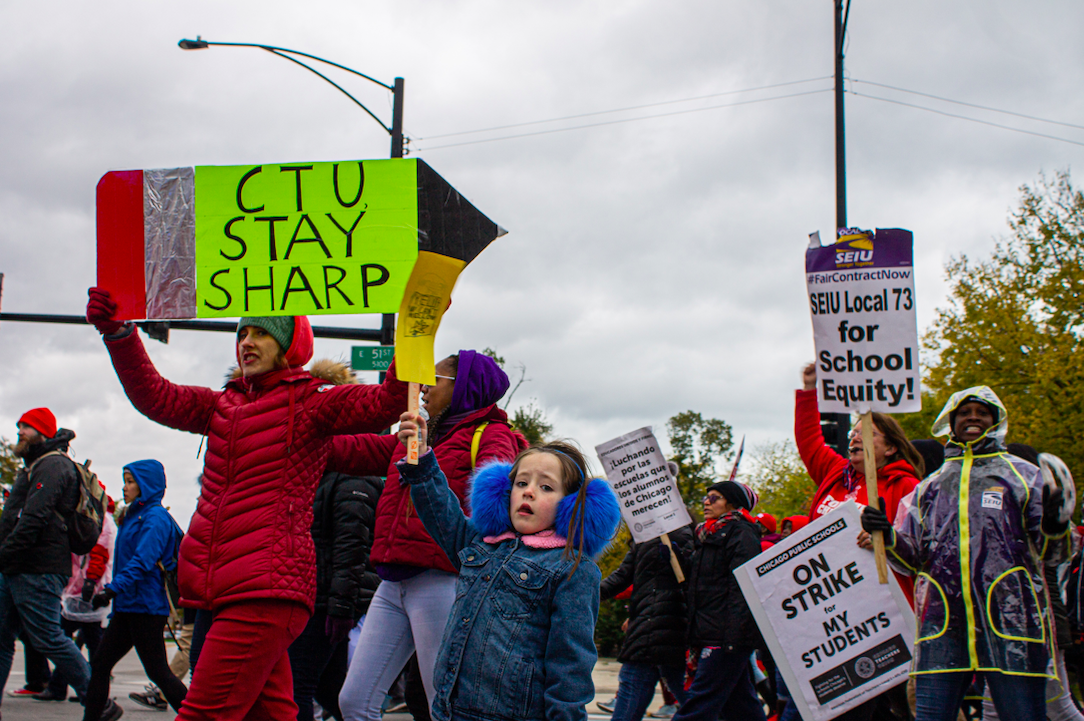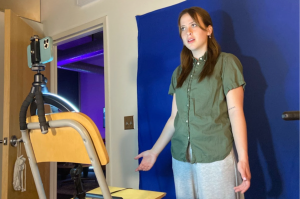Pamela Touras-Andrikopoulos didn’t want to be on the picket line on Tuesday morning at McPherson Elementary School on Chicago’s North Side, she said. The Chicago Teachers Union strike captain is also a parent of a child in Chicago Public Schools.
However, the eighth-grade teacher said parents struggling with child care as the strike enters its fifth day need to band together with CTU members to help staff schools where children go without librarians, social workers and nurses.
“For some reason, [people] think we enjoy this and we really don’t,” Touras-Andrikopoulos said. “We want to be in our classrooms teaching and doing our jobs. And it’s an inconvenience for parents — I’m a parent of a CPS student — I get it, you know. But we are trying to do what’s right for our children.”
Chicago Public School teachers and staff remained on strike Tuesday, with more than 25,000 educators on the picket lines. For the fourth day, classes were canceled for 300,000 students from the third largest school district in the country as teachers, security guards and aides protested outside mostly empty buildings.
Chicago Public Schools reported that 507 schools had a total of 6,289 students in attendance during the strike on Monday. During union strikes, principals and non-unionized staff provide educational activities as well as serve breakfast, lunch and take-home dinner for students during their school’s normal bell schedule.
Joseph Powers, principal of Jones College Prep in Chicago’s South Loop has come in every day of the strike to make sure children can come in to receive the resources as normal during school hours.
“It’s easy to say that I could get plenty of paperwork to take care of,” Powers said. “But [it’s] more important to me to kind of monitor what’s happening and make sure that we are prepared for when school reopens so that everything can start and operate efficiently from that point forward.”
After a weekend of negotiations, the CTU and the city of Chicago are still at odds over allotted class preparation time, sanctuary schools, class size reduction and the ability to hire support staff such as nurses and counselors. Neither side had come to the bargaining table as of Tuesday afternoon, and classes will be canceled again on Wednesday. Some union members did not expect to return to work until early next week.
“My child has been out of school for four days because the city refuses to recognize that my child needs more than one nurse at his school — that he shouldn’t have to share books with other students,” said 36-year-old Kira Smith, a stay-at-home mom of a fifth-grade boy who lives in the Austin neighborhood. “I’m out here not because I want to be, but because I have to fight for my child.”
According to CTU president Jesse Sharkey, bargaining efforts “took a turn for the worse” on Monday after Mayor Lori Lightfoot sent a letter asking Sharkey to end the strike without a contract for the students’ sakes.
“I don’t think there’s a striking worker in history that would go back to work without a contract if it were up to them,” said Jackson Potter, a teacher at Back of the Yards College Preparatory High School. “It looks like she’s gonna have to learn the hard way that negotiations are a two-way street,” he said of the mayor.
Drew Heiserman, 50, is a math teacher at Lindblom Math and Science Academy and a member of the bargaining team for the CTU.
“Lightfoot didn’t get serious until we went on strike,” Heiserman said. “It’s going to take a while to take care of all of these things, and the fact that she shut things down yesterday is going to draw it out further. She walked away from her responsibility to the kids, period.”
Hundreds of teachers and community supporters rallied Tuesday afternoon at Walter H. Dyett High School for the Arts in Washington Park on the city’s South Side.
“We don’t even have a building,” said Natalie Segura, 37, a Spanish and ESL teacher at Spry Community School in Little Village. “We’re asking for basic things,” said Segura, who marched at the rally. “[In] our neighborhood, in many cases, kids are immigrants. It is very difficult for a regular teenager to live through those years of confusion, so it’s even more difficult for kids in neighborhoods that have little resources.”
Where the union asked for a 15% pay raise over a three-year contract, Lightfoot proposed a 16% increase for teachers and lower increases for nurses, teaching assistants and school clerks over a period of five years.
Additionally, the city only offered an increase of one period of principal-directed preparation time for elementary school teachers.
Maressa Spinak, 35, special education teacher at Hawthorne Scholastic Academy in Lakeview, said the extra 30 minutes of prep time proposed by the union would be at least a small help to educators working outside of their paid hours.
“We get paid for 6.25 hours a day, so that’s 31.25 hours a week,” Spinak said. “The average teacher works 50 hours a week … which means that 37% of the work I put in each week is unpaid.”
However, the school district agreed to spend a minimum of $400,000 a year to recruit, train and hire social workers, case managers and nurses, as well as to write in the contract Lightfoot’s verbal offer to introduce more than 450 support staff positions.
Kyle Losey, a youth programming manager at Hyde Park Neighborhood Club, said he understands Lightfoot’s position of pressure as a newly elected mayor, and is ultimately rooting for both the city and the union to work things out.
“I hope for a quick and peaceful resolution [and that] the disadvantages within our education system are brought to light by the CTU because our children and teachers deserve better,” Losey said.
Janice Jackson, chief executive of Chicago Public Schools, said on Oct. 20 that the district would address overcrowding by providing $10 million for additional staffing.
Retired CPS instructional assistant Beverly Roberts said since many of the teachers’ demands have been met, the union and city board should come to an agreement so students can return to school.
“Mayor Lightfoot has been fair, realistic, and transparent about how meeting the teachers requests will greatly impact taxpayers and trying to strike a balance between both interests,” Roberts said.
Since the strike began, many notable public figures such as presidential candidates Joe Biden, Bernie Sanders and Elizabeth Warren have come forward to express their support for members of the union.
On Sept. 25, Sanders rallied with teachers for the beginning of the strike vote at the CTU headquarters, 1901 W. Carroll Ave., and Tuesday, Warren visited Oscar DePriest Elementary School in Austin on the city’s West Side.
On Monday, the union enlisted the help of the Rev. Jesse Jackson, civil rights activist and founder of the Rainbow PUSH Coalition, to reach a settlement with the city.
Rev. Jackson, who was integral to ending conflict between former Mayor Harold Washington and the union during its 1987 strike, said he hopes to produce a “fair and equitable deal” with his voice at the table.
Cherrell Downing, 33, a special education classroom assistant at Jones College Prep, said parents need to understand why educators are striking.
“I do realize it’s an inconvenience because they have to work,” said Downing, who lives in Hyde Park. “[But] we don’t have the funding or resources.”
Yaraira Torres, teacher at James Monroe Elementary School in Logan Square, and mother of three Chicago Public School students, said ultimately it is important the union ensures a fair contract where kids are taken care of and staff members have the resources to be able to teach properly.
“I think there is no better way to be heard than to withhold our labor and use our voices,” said the 43-year-old veteran. “Our voices are being amplified by our families, students, allies across the city — even now at a national level.”
Paige Barnes, Summer Hoagland-Abernathy, Isaiah Colbert, Breianna Ryle, Katie Kim, Heather Davies, Camron Miller, Carly Young, Elise Maclin, Jimi Hargraves and Julia Greene contributed to this story.












Be First to Comment